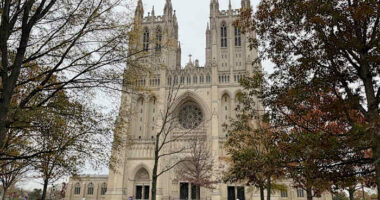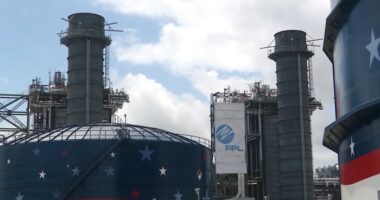Share this @internewscast.com

In the quiet region of northwestern Greece, a startling scene greeted a local farmer: three of his sheep lay lifeless, clearly victims of a brutal attack. The telltale signs—a series of large paw prints etched into the soil—left no doubt that a bear was responsible. Once an uncommon sight, bears have become more frequent visitors in this area, causing concern among residents.
“It was definitely a bear, a large one at that, and they’re appearing more often now,” shared Anastasios Kasparidis, a local farmer. Kasparidis wasn’t the only one affected; another nearby farmer reported losing chickens and pigs to the same predator. To safeguard his remaining sheep, Kasparidis moved his flock closer to his home, into a secure pen.
“Without taking these precautions, I’d likely lose all my sheep,” Kasparidis lamented. “The bears won’t stop until they’ve eaten them all.”
While environmentalists celebrate the resurgence of bear and wolf populations in Greece, thanks to protective measures that have banned hunting, not everyone shares their enthusiasm. Farmers and rural residents express growing concern for their livelihoods and safety. They are urging for increased protection measures, a debate that echoes throughout Europe, where some argue that conservation efforts have overstepped, calling for a reevaluation of current restrictions.
As the conversation continues, it becomes clear that the issue isn’t limited to bears. Wolves and wild boars are also part of the growing wildlife populations that are impacting human activities.
Brown bears, the largest predators in Greece, have experienced a significant recovery. Their population has quadrupled since the 1990s, according to Dimitris Bakaloudis, a wildlife management and conservation expert at the Aristotle University of Thessaloniki.
Up to an estimated 870 brown bears roam the forests of northern Greece, according to the most recent survey by Arcturos, an environmental organization set up in 1992 that provides a sanctuary for rescued bears and wolves.
And it’s not just bears. Wolves also have seen their numbers rise. While wolves could only be found as far south as central Greece in 2010, they have now spread to the outskirts of Athens and into the Peloponnese in southern Greece, Bakaloudis said.
Their recovery has been sustained in part by the also increasing population of wild boars, which is unrelated to conservation efforts. Rather, a combination of a number of factors, including a reduction of hunting, milder winters and cross-breeding with domestic pigs have led them to reproduce at a faster rate, Bakaloudis explained.
Viewed by many as pests that destroy crops, the sight of a dozen or more boars trotting along sidewalks or snuffling through backyards are no longer uncommon in many parts of Greece.
Increasing human encounters
The larger number of wild animals has also resulted in more contact with humans — the vast majority of whom are unfamiliar with how to behave during an encounter. Lack of familiarity has led to fear in some communities, particularly following a small number of serious incidents this year: a child bitten by a wolf, an elderly man injured by a bear in his yard, a hiker bitten by a bear and another hiker who died after falling into a ravine during a bear encounter.
In Levea, a village of about 660 people surrounded by fields in northwestern Greece, several bear encounters were reported in October, while boars frequently roam through the village, said community president Tzefi Papadopoulou. The bears especially had frightened residents.
“As soon as they heard a dog bark, they were ready to go out with the gun,” she said.
It’s similar in the nearby village of Valtonera, 170 kilometers west of Greece’s second largest city, Thessaloniki.
“The village used to be without wild animals. In the past, a wolf would appear once in a while,” said Konstantinos Nikolaidis, community president. Now, wild boars, foxes, bears or wolves roam around or even inside the village, he noted.
“This has caused concern among all residents. It’s now difficult for a person to walk around outside at night,” he said.
The burgeoning wild boar population, meanwhile, has led to calls for the hunting season to be extended.
Giorgos Panagiotidis, deputy mayor of the nearby small town of Amyntaio, said boars had been increasingly encroaching on houses. In May, he asked authorities for hunters to be allowed to shoot boars out of season to tackle the problem.
It’s an issue that isn’t unique to Greece. In a victory of farmers over environmentalists, European Union lawmakers voted in May to reduce protections for wolves across the EU’s 27 member states. The movement even gained support from European Commission President Ursula von der Leyen, whose pony Dolly was killed by a wolf three years ago.
Solutions
Experts note it isn’t just the larger number of wild animals that has led to encroachment on urban areas. Many factors are at play, they say, from loss of habitat due to wildfires, to noise disturbances from wind turbines and recreational vehicles, and animals emboldened by dwindling human populations in villages.
“There is of course fragmentation of the bears’ habitat, frequently there is drought, there’s a lack of food in the natural environment, there’s a desertification of villages which makes inhabited areas more attractive to bears, so they approach and find food,” said Panos Stefanou, communications officer at Arcturos.
Measures to keep wolves and bears at bay have been developed and approved by scientists, said Bakaloudis, the Thessaloniki university professor, including using lights around property, proper disposal of trash and dead livestock and avoiding feeding strays.
In exceptional circumstances more invasive methods are used, he said, such as in the case of the wolf attack on the child in northern Greece, where authorities decided to capture and remove the animal.
With so many factors contributing to increasing encounters between wild animals and humans, Stefanou cautioned against overly simplistic solutions.
“Killing the animals is not what will solve the problem,” he said.
Copyright 2025 The Associated Press. All rights reserved. This material may not be published, broadcast, rewritten or redistributed without permission.












